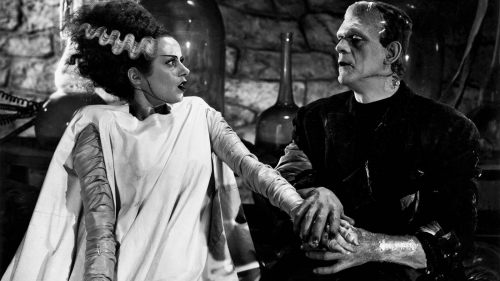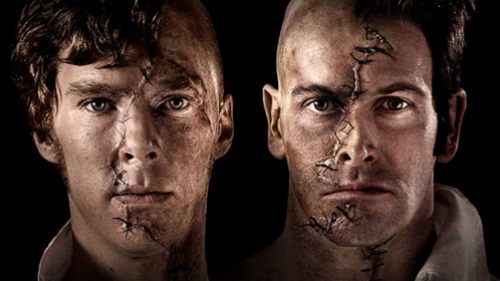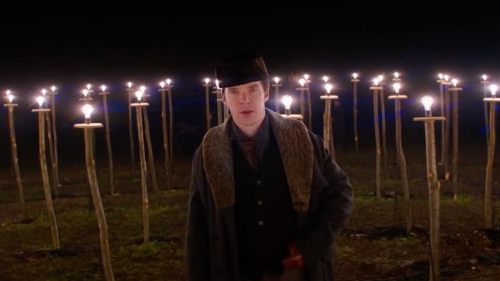Danny Boyle’s FRANKENSTEIN Just Wants You To Love It
Watching a recording of a play is difficult. It takes a very special theatrical production to transcend the format. You're losing the immediacy, the adrenaline of a live production. You're losing the freedom to cast your eyes on any detail of the stage that captures you, because a camera is telling you where to look, what to notice. You're losing that most thrilling aspect of the theatre: the idea that on this night, in this production, anything could happen.
Danny Boyle's Frankenstein is a very special production.
During last night's screening, part of the National Theatre Live program, it took me only a few minutes to adjust to the forced distance of watching a play that was performed two years ago on a movie screen. I felt the loss of immediacy, of freedom, but then all of a sudden...I didn't. One moment I was remembering that I was in a cinema in Houston and the next, I was at the Royal National Theatre in London in 2011. And the moment after that, I was in Ingolstadt in 1818, then Geneva, then Orkney. We speak to theatre's power to transport us, but to do that from a stage through a camera over the years and across continents, rather than from the short distance of your seat to the apron, is some extraordinary magic.
Much of the magic comes directly from Nick Dear's poignant adaptation of Mary Shelley's novel. The very words of this play, all production aside, are ablaze with passion and ideas. But Boyle's direction is some of the best I've ever seen onstage, thoughtful and direct, laden with meaning but deft, nimble. The stage design is simply brilliant, a stationary circular stage with a smaller, rotating circle within, contrasting concentric circles always changing and shifting. A single track bisects the circle: sometimes it's covered in grass and we're in the forest, other times a train chugs across and we're in an industrial ghetto; it becomes a wooden plank and we're standing on a bridge over a Swiss lake. Panels open and structures are elevated from below or lowered from above. The entire configuration is illuminated by a vast expanse of hanging light bulbs of different shapes and sizes, flickering and glowing in impossibly lovely - or sometimes ominous - patterns. It's something else.
And, oh, the way these men move on that stage. Every night the two leads - Benedict Cumberbatch and Jonny Lee Miller, each responsible for a different current interpretation of Sherlock Holmes - would alternate the roles of Victor Frankenstein and The Creature. In this way, one imagines, a little of The Creature infected the role of Frankenstein, and some of Frankenstein colored the role of The Creature. This could hardly be an accident, as the play examines the ways that our creators - our parents, our gods - maintain a relentless hold on our psyches, and the ways that those creators attempt, with little success, to abdicate the responsibility of what they've created.
The production I saw had Benedict Cumberbatch in the role of Victor and Jonny Lee Miller in the role of The Creature, and while I'd probably say this even if I'd seen the opposing version, I can't imagine watching it any other way. Cumberbatch is cold and stilted as Frankenstein, a man who must create life to prove to himself that he is all powerful benevolence: a mother of science. He can barely touch his fiancée Elizabeth (the incredible Naomie Harris, who previously worked with Boyle on 28 Days Later); he rarely looks at her, so the creation of life the old-fashioned way is somewhat out of the question.
We see Miller born onstage in the opening moments of the play, tumbling out of a beating canvas womb, and we watch as he learns to move the way a toddler learns to move. We see his joy in discovering grass, the sun, the snow, words. After he is cast out almost instantly from Victor's laboratory - the doctor cannot face what he has made, and he abandons his creation within minutes - he is welcomed by a blind old man who can't be repulsed by The Creature's disfigurement. De Lacey (a warm and expansive Karl Johnson) teaches The Creature how to express his feelings, how to read. He even teaches him his Milton, and if you think Paradise Lost doesn't have anything to do with Frankenstein, you've been reading it wrong.
Did I request thee, Maker, from my Clay
To mould me Man, did I solicit thee
From darkness to promote me?
In the end, like everything, Frankenstein is about our need to be understood, to be accepted. We rail at those who created us, we are indignant and resentful - but what we are really asking of them is to love us, and for them to allow us to love them in turn. Of course the roles of Frankenstein and The Creature were performed by both actors: these men are inextricably connected. They are nothing without each other.
Thou art my father
Thou my author
Thou my being gav'st me;
Whom should I obey but thee,
Whom follow?
Encore screenings of Frankenstein are touring the country right now. Check the website to see if there's one near you.



